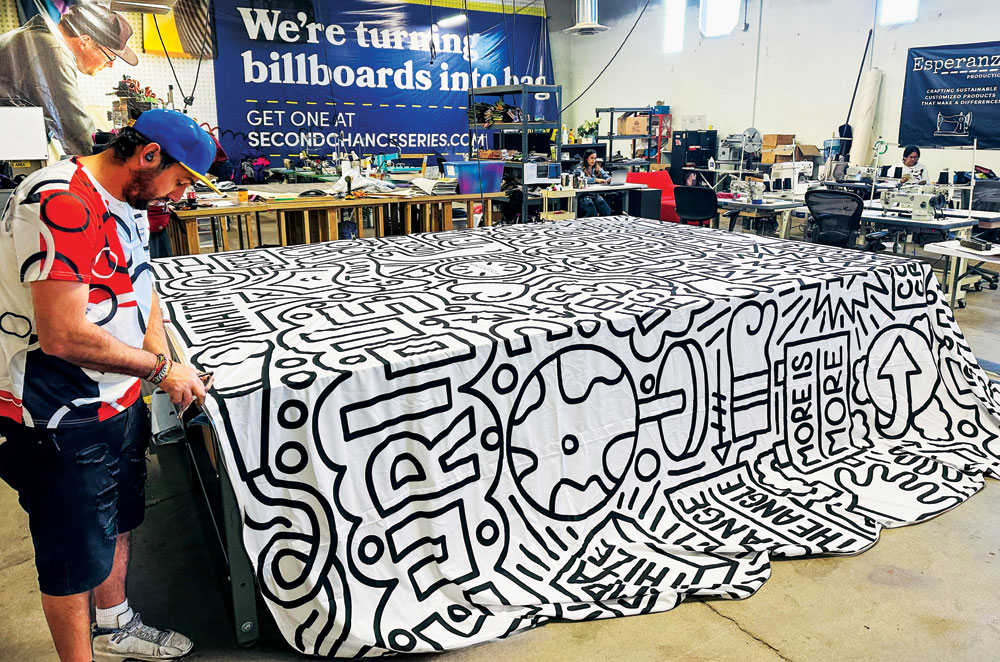
An Esperanza team member works in the Mile High WorkShop warehouse, preparing a large vinyl billboard banner for design and cutting. It will eventually be transformed into upcycled tote bags.
Lenard Brown is wearing headphones and concentrating intently as he cuts fabric into pieces that will later be sewn into fleece mittens. For the past six weeks, he’s been getting job training, life coaching, and a variety of other supportive services at the Mile High WorkShop in northeast Denver. Brown says the program has been a lifeline as he navigates re-entry into the workforce after 20 years in prison. “It means a lot to me that I’m being given another chance.”
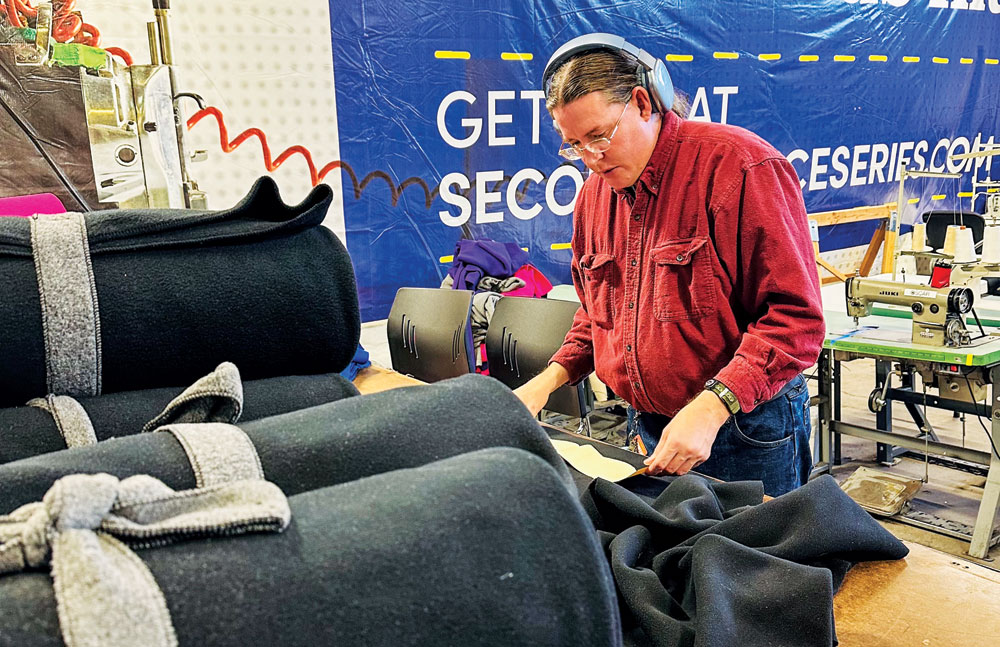
Lenard Brown, a workshop participant, says he loves the creativity that industrial sewing requires.
The mission of the non-profit organization is to provide training and employment opportunities for people seeking to rebuild their lives after dealing with addiction, homelessness, or incarceration. “We focus on helping people stabilize. We focus on their housing and their health. We focus on communication and healthy relationships,” says executive director Adrienne Tafilowski. “There are so many things that people have to iron out before they’re ready for the workforce.”
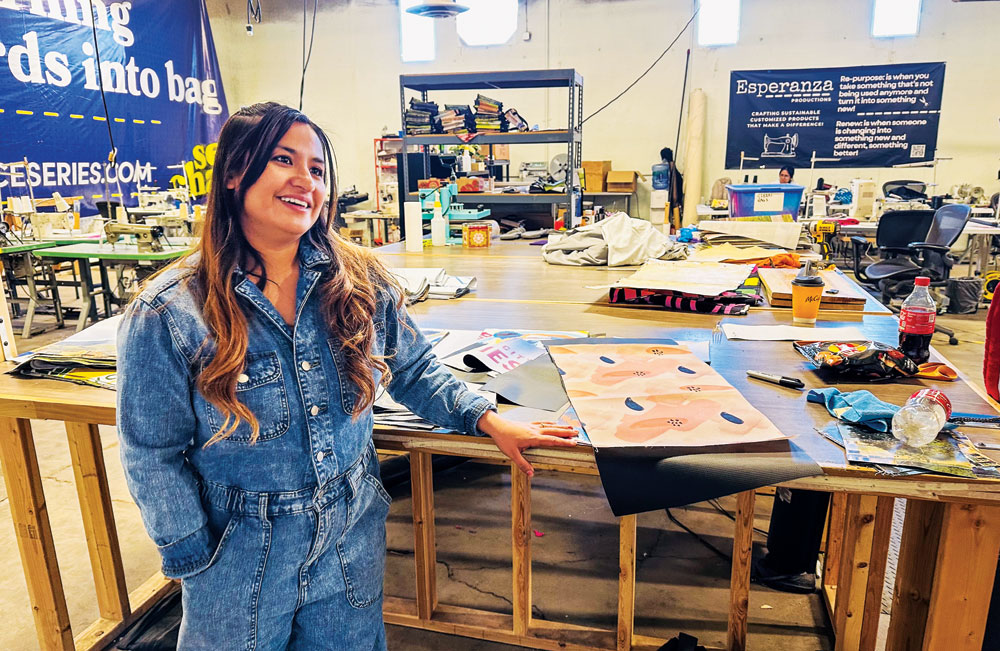
Fashion designer Irma Reyes heads up Esperanza Productions, a sewing shop within the Mile High WorkShop.
Mile High WorkShop also has a secondary mission of repurposing items that would otherwise be considered trash—whether that’s the vinyl from old billboards and banners or bolts of obsolete fleece and fabric donated by a major outdoor clothing retailer. Those things are then sewn into bags, blankets, mittens, and more.
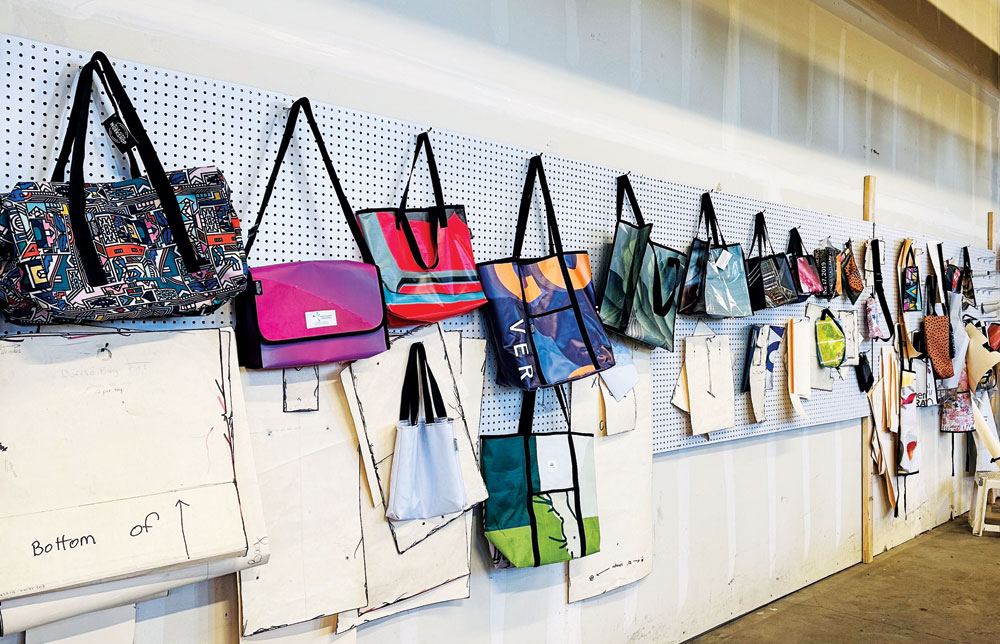
The Mile High WorkShop sells a wide variety of bags that are created from discarded banners.
Irma Reyes, a fashion designer by training, has taught at the workshop for nearly 10 years. She says last year, the operation managed to divert three tons of trash from the landfills. “For example, the City of Denver donates old banners, we turn them into bags that the city buys back to give to low-income people to use at grocery stores,” says Reyes. The program is funded by the bag fee that grocery stores are required to charge following passage of the Plastic Pollution Reduction Act. Upcycled bags are also sold on the workshop’s website.
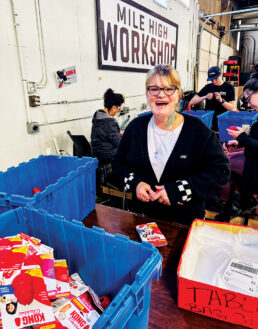
The demand for upcycling has grown so much that Reyes spun off a secondary non-profit called Esperanza Productions (meaning “hope” in Spanish) that is located in the same warehouse. Reyes still teaches participants in the workshop’s training program, but she also has permanent staff, including graduates of the Mile High WorkShop.
The non-profit, which was formed 10 years ago, recently revamped its program to try to serve more people. The standard training program is eight weeks in length, participants receive resume and interview coaching in addition to training for industrial sewing, forklift driving, assembly line work, and other warehouse skills. Participants are paid $300 a week. “We think the paid training is important because we teach people ‘how to job’—which means showing up on time, using certain office apps, and learning other technology that is required on the job,” says Tafilowski.
Partnerships with other non-profits are key to the workshop’s success, and its 19,000 square foot facility also houses Teach by Tech, the Denver Dream Center, and Second Chance Bike Shop. The organizations work together in the training program and sometimes provide full-time jobs to graduates. Tafilowski likes to think of it as an “ecosystem hub for workforce development.”
At the time of the Front Porch visit, Kimberly Thomas was two weeks away from graduating and she just found out she had secured a full-time job as an assistant manager in a Safeway deli. “I’m almost 50 and I struggled with addiction for almost 25 years. I’m now 17 months clean,” she says proudly. The Mile High WorkShop was her first job training program, and she was enthusiastic about it. “It has inspired me and given me hope. I’m moving up!”
Tafilowski says that is precisely the goal of the workshop. “We are a place for new beginnings. When we’re repurposing materials like old banners, it becomes a good tool to talk about having a new vision for our lives,” says Tafilowski. “We feel we’ve done a great job if our graduates feel like they are living a life with purpose.” For more information, visit MileHighWorkShop.org
Front Porch photos by Christie Gosch



0 Comments